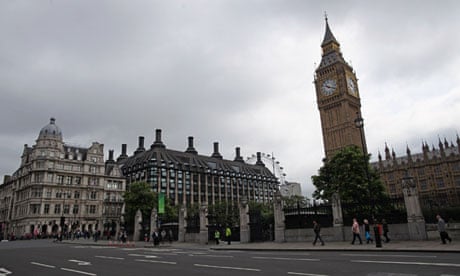Hundreds of British Asians will gather in Parliament Square on Tuesday to urge MPs to introduce legal protection for those from traditionally lower-caste backgrounds.
A coalition of community groups, human rights organisations and politicians has been campaigning for a change in the law that would make it an offence for people to discriminate on the grounds of caste.
A report on the issue commissioned by the government three years ago estimated that there were between 50,000 and 200,000 people in Britain who are classified as low caste. The study, by the National Institute of Economic and Social Research, identified evidence of discrimination, harassment and exclusion in schools, provision of services and in the workplace.
Another survey, published in 2009 by the Anti-Caste Discrimination Alliance, found that 58% of those questioned felt they had been discriminated against because of their caste status, while 78% said they did not think the police would understand if they tried to report a caste-related hate crime.
A number of the respondents – 71% of whom identified themselves as members of the Dalits, who were formerly known as "untouchables" because of their low-caste status – said they had been asked, directly or indirectly, about their caste background by their family doctor, nurse or a community care nurse.
Although a section of the Equality Act 2010 could offer lower-caste British Asians a legal safeguard against caste discrimination, it has not yet been activated despite repeated demands. The government has instead indicated that it plans to tackle the issue of caste discrimination through an educational initiative before resorting to legislation.
But that could change on Tuesday when MPs vote on a cross-party amendment – passed in the House of Lords – that would make caste a protected characteristic under the act.
The calls for action have increased after an employment tribunal hearing the first claim for unfair dismissal on the grounds of caste discrimination collapsed in February. Vijay Begraj, a former practice manager at the Coventry law firm Heer Manak, and his wife, Amardeep, claimed they suffered discrimination, humiliation and victimisation because he is of a lower caste than her and their former employers.
Vijay Begraj told the tribunal he had been assaulted by two relatives of one of the company's partners and had been called derogatory names relating to his Dalit status. Heer Manak denied the claims, which it described as "ludicrous" and "outrageous".
After sitting on and off for 36 days since August 2011 to consider 110 allegations, the tribunal was abandoned after information handed to the judge by police officers led the judge to recuse herself from the case. The couple, who were deeply disappointed by the decision, are considering an appeal.
A spokesman for Caste Watch UK, one of the groups campaigning for a change in the law, said the lack of legal protection for those from lower castes was not consistent with other equalities legislation.
"It is unfortunate that even after living in British society for nearly six decades, some South Asians have still not been able to change their rigid caste-prejudiced attitudes towards fellow citizens who happen to be born in so-called low castes," he said.
The Anti-Caste Discrimination Alliance said there was more than enough evidence to convince MPs of the need for action beyond the government's educational initiative.
"This amendment clause will provide the long-overdue clarity in the law that people are not discriminated [against] because of their caste in the areas covered by the Equality Act 2010," said a spokesman.
"It will also help bring about the change in behaviours – as the equality law has done in areas in the past, for example on race – that the educational approaches announced alone will not achieve."
However, the move is being opposed by an umbrella group of organisations that represents up to 1 million UK Hindus.
The Alliance of Hindu Organisations UK argues that making caste a protected characteristic will serve only to exacerbate old divisions.
It also fears that the amendment, if passed, would result in the Hindu community being regarded as "institutionally discriminatory".
A spokesman said it was keen to move beyond the issues of the caste system, adding: "We strongly believe that modern Hindus do not care about what caste someone came from. This legislation would take us back to the past where we do not want to go."
The Liberal Democrat peer Lord Avebury, who supported the amendment in the Lords, said he found such arguments difficult to understand.
"It's as if you were saying you won't have laws against racial discrimination because it's blaming the whole of the white population for racism," he said. "Nobody's saying that Hindus are generally responsible. It's just some individuals within the community, as it is with any other form of discrimination, whether it's on age or gender, sexual orientation or whatever.
"All the characteristics that are names in the act are the same and it's impossible to distinguish between them and caste."A spokesperson for the Department for Culture, Media and Sport said: "This is a deeply complex issue and we have not seen any evidence so far that suggests that legislation is the most appropriate way of dealing with caste discrimination, to the extent that this exists in Britain.
"That's why we believe the right way to tackle this issue is by working with the communities that are most affected, through education and discussion.
"Tomorrow is the first time that it will be debated substantively in the House of Commons and we've have already laid a written ministerial statement which outlines our approach to this issue."
